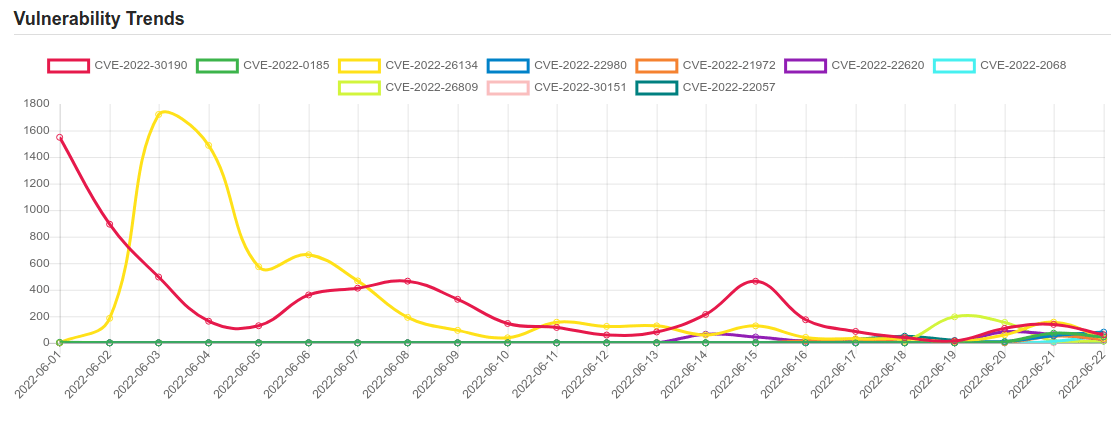Daily Vulnerability Trends: Thu Jun 23 2022

| CVE NAME | CVE Description |
| CVE-2019-13382 | UploaderService in SnagIT 2019.1.2 allows elevation of privilege by placing an invalid presentation file in %PROGRAMDATA%\TechSmith\TechSmith Recorder\QueuedPresentations and then creating a symbolic link in %PROGRAMDATA%\Techsmith\TechSmith Recorder\InvalidPresentations that points to an arbitrary folder with an arbitrary file name. TechSmith Relay Classic Recorder prior to 5.2.1 on Windows is vulnerable. The vulnerability was introduced in SnagIT Windows 12.4.1. |
| CVE-2019-3582 | Privilege Escalation vulnerability in Microsoft Windows client in McAfee Endpoint Security (ENS) 10.6.1 and earlier allows local users to gain elevated privileges via a specific set of circumstances. |
| CVE-2020-9715 | Adobe Acrobat and Reader versions 2020.009.20074 and earlier, 2020.001.30002, 2017.011.30171 and earlier, and 2015.006.30523 and earlier have an use-after-free vulnerability. Successful exploitation could lead to arbitrary code execution . |
| CVE-2022-26937 | Windows Network File System Remote Code Execution Vulnerability. |
| CVE-2022-1040 | An authentication bypass vulnerability in the User Portal and Webadmin allows a remote attacker to execute code in Sophos Firewall version v18.5 MR3 and older. |
| CVE-2022-2156 | No description provided |
| CVE-2022-0492 | A vulnerability was found in the Linux kernel’s cgroup_release_agent_write in the kernel/cgroup/cgroup-v1.c function. This flaw, under certain circumstances, allows the use of the cgroups v1 release_agent feature to escalate privileges and bypass the namespace isolation unexpectedly. |
| CVE-2021-38665 | Remote Desktop Protocol Client Information Disclosure Vulnerability |
| CVE-2022-33139 | A vulnerability has been identified in SIMATIC WinCC OA V3.16 (All versions in default configuration), SIMATIC WinCC OA V3.17 (All versions in non-default configuration), SIMATIC WinCC OA V3.18 (All versions in non-default configuration). Affected applications use client-side only authentication, when neither server-side authentication (SSA) nor Kerberos authentication is enabled. In this configuration, attackers could impersonate other users or exploit the client-server protocol without being authenticated. |
| CVE-2022-21662 | WordPress is a free and open-source content management system written in PHP and paired with a MariaDB database. Low-privileged authenticated users (like author) in WordPress core are able to execute JavaScript/perform stored XSS attack, which can affect high-privileged users. This has been patched in WordPress version 5.8.3. Older affected versions are also fixed via security release, that go back till 3.7.37. We strongly recommend that you keep auto-updates enabled. There are no known workarounds for this issue. |
| CVE-2022-30190 | Microsoft Windows Support Diagnostic Tool (MSDT) Remote Code Execution Vulnerability. |
| CVE-2022-0185 | A heap-based buffer overflow flaw was found in the way the legacy_parse_param function in the Filesystem Context functionality of the Linux kernel verified the supplied parameters length. An unprivileged (in case of unprivileged user namespaces enabled, otherwise needs namespaced CAP_SYS_ADMIN privilege) local user able to open a filesystem that does not support the Filesystem Context API (and thus fallbacks to legacy handling) could use this flaw to escalate their privileges on the system. |
| CVE-2022-26134 | In affected versions of Confluence Server and Data Center, an OGNL injection vulnerability exists that would allow an unauthenticated attacker to execute arbitrary code on a Confluence Server or Data Center instance. The affected versions are from 1.3.0 before 7.4.17, from 7.13.0 before 7.13.7, from 7.14.0 before 7.14.3, from 7.15.0 before 7.15.2, from 7.16.0 before 7.16.4, from 7.17.0 before 7.17.4, and from 7.18.0 before 7.18.1. |
| CVE-2022-22980 | No description provided |
| CVE-2022-21972 | Point-to-Point Tunneling Protocol Remote Code Execution Vulnerability. This CVE ID is unique from CVE-2022-23270. |
| CVE-2022-22620 | A use after free issue was addressed with improved memory management. This issue is fixed in macOS Monterey 12.2.1, iOS 15.3.1 and iPadOS 15.3.1, Safari 15.3 (v. 16612.4.9.1.8 and 15612.4.9.1.8). Processing maliciously crafted web content may lead to arbitrary code execution. Apple is aware of a report that this issue may have been actively exploited.. |
| CVE-2022-2068 | In addition to the c_rehash shell command injection identified in CVE-2022-1292, further circumstances where the c_rehash script does not properly sanitise shell metacharacters to prevent command injection were found by code review. When the CVE-2022-1292 was fixed it was not discovered that there are other places in the script where the file names of certificates being hashed were possibly passed to a command executed through the shell. This script is distributed by some operating systems in a manner where it is automatically executed. On such operating systems, an attacker could execute arbitrary commands with the privileges of the script. Use of the c_rehash script is considered obsolete and should be replaced by the OpenSSL rehash command line tool. Fixed in OpenSSL 3.0.4 (Affected 3.0.0,3.0.1,3.0.2,3.0.3). Fixed in OpenSSL 1.1.1p (Affected 1.1.1-1.1.1o). Fixed in OpenSSL 1.0.2zf (Affected 1.0.2-1.0.2ze). |
| CVE-2022-26809 | Remote Procedure Call Runtime Remote Code Execution Vulnerability. This CVE ID is unique from CVE-2022-24492, CVE-2022-24528. |
| CVE-2022-30151 | Windows Ancillary Function Driver for WinSock Elevation of Privilege Vulnerability. |
| CVE-2022-22057 | Use after free in graphics fence due to a race condition while closing fence file descriptor and destroy graphics timeline simultaneously in Snapdragon Auto, Snapdragon Compute, Snapdragon Connectivity, Snapdragon Industrial IOT, Snapdragon Mobile, Snapdragon Wearables |
If you like the site, please consider joining the telegram channel and supporting us on Patreon using the button below.


